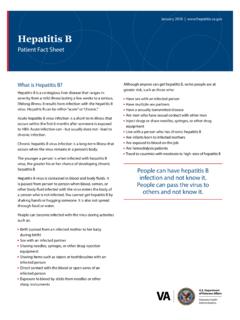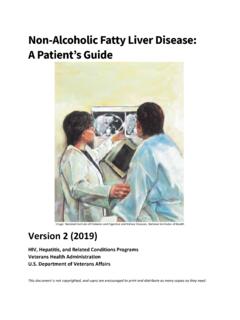Transcription of Hepatitis A Patient Fact Sheet - Veterans Affairs
1 Hepatitis A Patient Fact SheetJanuary 2019 | is Hepatitis A? Hepatitis A is a contagious liver disease that is a result of infection with the Hepatitis A virus. The disease can range in severity from a mild illness lasting a few weeks to a severe illness causing liver failure. Most people infected with the virus develop symptoms within 2-6 weeks of exposure. Symptoms usually last less than 2 months but can last up to 6 months. Hepatitis A can be more serious and potentially life threatening for older people and people who already have liver disease such as chronic Hepatitis B or C. Unlike Hepatitis B and C, Hepatitis A does not turn into a chronic is Hepatitis A spread?
2 The Hepatitis A virus is usually spread by putting something in your mouth that is contaminated with the virus. The virus is found in the stool (feces) of people with Hepatitis A and is spread when someone s stool gets into food or water. This can happen when an infected person does not adequately wash his or her hands after using the bathroom then touches other things such as food. When other people eat that food, they can get infected with Hepatitis A. Usually the transmission is between people in very close personal contact. For up to 2 weeks before symptoms appear, people can be infected with Hepatitis A and can pass the virus to themselves can be contaminated with Hepatitis A virus, such as raw oysters harvested from sewage-contaminated water.
3 When people eat food contaminated with Hepatitis A virus, they can get infected with the A is usually spread through: Household c ontact with an infected person S exual contact with an infected person Ea ting or drinking contaminated food or water Shar ing eating utensils that are contaminated T ouching contaminated surfaces and then placing your hands near or in the mouthWho is at risk for Hepatitis A?Anyone can get Hepatitis A. In the United States, certain groups are at higher risk, such as people who: T ravel to or live in areas where Hepatitis A is common A re family members or caregivers of a recent adoptee from countries where Hepatitis A is common Liv e with someone who has Hepatitis A A re men who have sex with men U se illegal drugs, whether injected or not Ha ve clotting-factor disorders, such as hemophilia Ha ve sexual contact with someone who has Hepatitis A A re experiencing homelessnessWhat can I do to prevent Hepatitis A?
4 Practice good personal hygieneBecause so many cases of Hepatitis A are due to close contact with an infected person, you should always practice good personal hygiene, especially by washing your careful in high-risk situationsBoil water or drink bottled water in areas where there is a risk for Hepatitis A cooked foods and fruits that you can peel and avoid eating vegetables or fruits that could have been washed with contaminated water, such as eating raw or steamed shellfish, such as oysters, that live in contaminated condoms correctly and every time you have vaccinatedThe best way to prevent Hepatitis A is to get vaccinated. The vaccine is very effective and can keep you from ever getting Hepatitis A.
5 You will not get Hepatitis A from the Department Veterans Health AdministrationHepatitis A vaccination is recommended for: Travelers to countries that have high rates of Hepatitis A Family members or caregivers of a recent adoptee from countries where Hepatitis A is common Men who have sex with men Users of injection and non-injection illegal drugs People with chronic (lifelong) liver diseases, such as Hepatitis B or Hepatitis C People who are treated with clotting-factor concentrates People who work with Hepatitis A infected animals or in a Hepatitis A research laboratory People experiencing homelessnessPeople with HIV should also consider getting vaccinated for Hepatitis A.
6 Speak with your VA health care provider to see if you should be vaccinated against Hepatitis A. How will I know if I have Hepatitis A?Your doctor can tell you if you have Hepatitis A by taking a sample of your blood. A blood test for a specific antibody called the Hepatitis A IgM antibody will show if you have recently been infected with Hepatitis A. Your doctor will also talk to you about your symptoms, which may include the following: Yellowing of the skin or eyes (called jaundice) Feeling very tired Stomach pain Not feeling very hungry Dark urine Nausea Diarrhea Low-grade feverThough some people do not have any symptoms, Hepatitis A usually makes people feel sick.
7 Adults with Hepatitis A are often too ill to work for up to a month. People with Hepatitis A sometimes have to be hospitalized (up to 1 person in 5). In rare cases, people die as a result of Hepatitis A (about 3 to 6 deaths per 1,000 cases).Will blood tests show if I have Hepatitis A, or if I have ever been infected before?Your doctor can tell if you had Hepatitis A in the past by testing your blood for the Hepatitis A IgG antibody. This antibody will always be positive if you have had Hepatitis A in the past, or been vaccinated for Hepatitis A. If you are currently, or were very recently, infected with Hepatitis A, you will have both the IgG and the IgM antibody in your I think I have been exposed to Hepatitis A, what should I do?
8 Call your health care provider to be evaluated and tested for Hepatitis A. If you were exposed within the past 2 weeks and had never been vaccinated, then you can receive a post-exposure vaccination. You can be treated with either the Hepatitis A vaccine or Hepatitis A immune globulin. How is Hepatitis A treated?There are no specific Hepatitis A treatments. Treatment depends on how ill each person is. Most people can recover with adequate rest, good nutrition, and drinking plenty of fluid. Some people get very ill and must be monitored and receive fluids in a hospital. During the time of the infection, alcohol must be completely avoided.
9 Anyone diagnosed with Hepatitis A should follow up with a health provider to check the status of their liver and test for Hepatitis B, Hepatitis C, and with your VA health care provider to see if you should be vaccinated against Hepatitis A. Who can I contact for more information? Call your local VA medical center and visit More information is available from the Centers for Disease Control and Prevention (CDC) at









